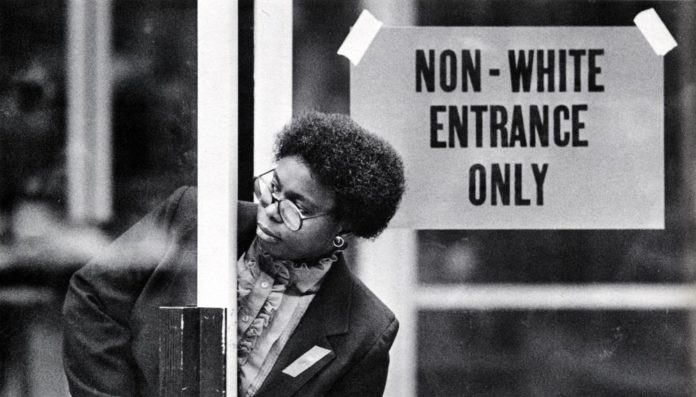I learned a lot about left-wing thinking, and the ideas driving topics like Critical Race Theory as a student in an undergraduate Social Work program. The first semester was deemed the pre-social work semester. This is where the professors weed out those students who don’t share in the field’s ideological underpinnings, like social justice and systematic racism. The big assignment at the end of the semester was an eight-page position paper on white privilege. The intent was for the student to read Peggy McIntosh’s essay, Unpacking the Invisible Knapsack, and discuss their newly gained revelations on the societal advantages they have simply for being white. Part two of the assignment was to stand in front of the class and discuss these revelations. This is an effective method of thought reform that is commonly used in communist regimes. I refused to do this. I saw a connection between this concept of white privilege and the constant accusations of racism coming from the Obama administration against those opposing Obamacare. I wrote my paper on affirmative action, and how the primary goal is to fill diversity quotas as opposed to hiring or recruiting the most qualified candidate. This applies to minorities as well. Throughout the paper I cited several instances in which a qualified applicant to a prestigious university, who happened to be black, was rejected in favor of a less qualified candidate, simply to meet the quota, and because of the left’s demented views on merit and individual efforts. This paper, and my inability to keep my mouth shut, haunted me throughout the program and into the master’s program as well. It is the reason that I am now a writer and not a clinical social worker.
Critical Race Theory is as convoluted as any theory the left can come up with. Because it is a product of Marxist thinking, there is no truth to which it clings. Critical Theory itself was a product of the Marxist Frankfurt School of Social Research, and the intent was to criticize the dominant culture’s norms for the purpose of creating doubt and initiating social change. On the surface, it seems that Critical Theory serves a useful purpose, as the intent was to liberate men from systematic forms of oppression. The question then becomes, what is considered a form of oppression? Being heavily infected with a Marxist bias, Critical Theory seeks to eliminate systems Marx considered oppressive. Western civilization, capitalism, and the ideas driving human freedom. Freedom itself holds different meanings for the left than for those on the right. Personal responsibility, individualism, and free will make up the right’s worldview. The left sees human freedom as being free from responsibility, being free to, as Brock Chisholm said, follow our natural urges. Chisholm was a psychiatrist who advocated the use of psychology in schools to steer people away from what he viewed as the lowest common denominator of all civilizations. Christian morality.
Psychology and the different views of human freedom are applied in today’s Critical Race Theory as well, particularly when it comes to programs like Affirmative Action. Critical Race scholars trap themselves in a corner where on one hand, they criticize those who attempt to take a color-blind approach to issues like achievement and equality, and on the other, they claim that race is a social construct, designed to perpetuate systems of white supremacy. They criticize those on the right who oppose affirmative action and welfare on the grounds that it limits opportunities for minorities. Why? Unless you are of the opinion that minorities cannot survive without such programs. In that case, who harbors the racist attitudes? Delgado and Stefancic argue that white people oppose affirmative action because we fear it as a system that discriminates against us. Our white privilege prompts us to see everything through the lens of white normality, and our societal normalness carries with it an implicit innocence. When a white man is passed over for a person of color under Affirmative Action programs, feelings of resentment rise, and because we view ourselves as being innocent, the person of color must then be guilty. This is the type of deluded thinking that comes from viewing everything through a Critical Theory perspective. Mainstream America believes in individual effort and merit. The most qualified person should get the position, no matter what color or race they happen to be. Taking a color-blind approach means we see past the superficial aspects of a person’s race and see them for their own individual characteristics. Critical Race scholars claim this approach diminishes attempts to eradicate racism, while at the same time, insisting society fails to see the characteristics we all share as human beings. Doesn’t taking a color-blind approach achieve this goal? Wouldn’t it be more racist to abandon the color-blind approach and view everyone through a race-based lens?
Critical Race Theorists, like all other Marxist scholars, reject ideas of equality under the law, and other western concepts like merit-based achievement, in favor of their own theoretical perspectives. There is no foundational truth in what they are claiming. They are only pushing their theories from the pre-existing bias that racism is inherent in American society. If they reject the American-held notion of equality under the law, and equality of opportunity, and favor a system of race-based preferences, or a race-based approach to change, as Delgado and Stefancic argue, wouldn’t they be the real racists?
To the left, the idea of achievement is a social construct that perpetuates whiteness. In a paper entitled The Sociopolitical Turn in Mathematics Education, Rochelle Gutiérrez argues that meritocracy is a myth. The idea of merit itself simply means that people achieve based on their own individual efforts and that we are all equally capable of pursuing our own ambitions. Are we all equally capable of achieving the same things? Of course not, however, we live in a country where equality of opportunity means we can pursue whatever endeavor we wish, and our successes and failure are our own responsibility. While this is an obvious truth to people on the right, it is a truth rejected by Critical Race Scholars because they have this sycophantic idea that minorities need their help to achieve anything at all. Just because they reject American notions of equality of opportunity and equality under the law in favor of their Marxist view, doesn’t mean those notions don’t exist.
As noted earlier, Brock Chisholm, in a speech before the World Health Organization, claimed that the Western worldview was an impediment to real human freedom and that psychology should be used in the public schools to eradicate what he, and many on the left consider being traditional morality. Individualism and “meritocracy” would certainly be considered major tenets in western philosophy. To understand the relationship between psychology and Critical Race Theory, or the criticisms against merit-based achievements, you must understand that psychology, in essence, replaced God. Behaviorist B.F. Skinner explained it by breaking down studies of human behavior into two categories. The pre-scientific view and the scientific view.
Before the application of psychology to the study of behavior, men were viewed as free, autonomous beings, who were largely responsible for their own successes or failures. We have free will, which carries with it the implication of assuming responsibility for our choices. Skinner argues that the scientific view, in the pursuit of understanding human motivation, posits the notion that men do not have free will, and the behaviors, achievements, successes, and failures are not due to their own willful actions, but to a “genetic endowment traceable to the evolutionary history of the species and the environmental circumstances to which as an individual, he has been exposed” (p. 101). Skinner argues that neither of these views can be proven beyond any doubt but that the latter when trying to understand behavior, should be applied because it allows for a more scientific approach to the study and control of behavior.
This is important to understand if we are going to challenge the notions of Critical Race Theory. If the left is rejecting notions of equality or meritocracy, it is doing so not only on Marxist grounds but through the lens of behaviorism as well. Looking at behavior through the scientific view, they base Critical Race Theory on the notion that minorities are unable to overcome systematic racism. White supremacy, in their view, is so embedded in our cultural norms and has been since our founding, that this is the environment that shapes the behavior of minorities. The reason minorities are poor, or struggle more in school, is because of the environmental circumstances surrounding them. This may be true, to a degree, but just as I had asked in my previous article, would things be different if the whole issue was viewed from a different perspective? The perspective of CRT academics is tainted with Marxist thought and evolutionary theory. It is starting out from the position that man’s achievements are not his own, only products of the environment that surround him. White people have the benefit of living in a society built just for them, therefore, they are more successful. Minorities are victims of institutionalized oppression; they cannot overcome this because the scientific view demands we assume environments control behavior and not free will. Are Critical Race theorists not making things worse by constantly referring to things like achievement and merit as social constructs that perpetuate white supremacy, as Rochelle Gutierrez does in her article? Would we not be better served by teaching the concepts of personal responsibility, and that our own choices will determine our successes or failures? Wouldn’t minority students feel more motivated to try if they believed they had a chance of achieving something based on their own efforts as opposed to constantly being told merit is a myth and a white construct? Unfortunately, the idea of human freedom is completely rejected by the left. Skinner states in Science and Human Behavior that individual achievements do not prove the notion that men are free, only that behavior may be beyond the realm of a controlling science.
Proposing solutions to Critical Race Theory goes beyond the race-baiting lessons being taught in elementary school. The notions of human behavior itself, viewed through a scientific, evolutionary perspective, must be rejected if American ideals like equality of opportunity and merit-based achievement can be realized for everyone.

























